Oregon Shooting Puts Spotlight Back On Mass Shooting 'Contagion Effect'

Thursday’s shooting at the Umpqua Community College in Roseburg, Oregon, in which a gunman fatally shot nine people, was the 294th mass shooting -- incidents where four or more people were killed or injured by gunfire -- in the U.S. this year, according to data compiled by the Mass Shooting Tracker. The incident once again raised questions over how the media should cover such crimes, and whether news coverage can inspire copycat killings.
According to reports from the New York Times and CNN, the gunman in the Oregon shooting incident had, in several blog posts, referenced recent shooting incidents and in one case expressed sympathy for the shooter.
“Seems the more people you kill, the more you're in the limelight,” the shooter, identified as Chris Harper-Mercer, reportedly wrote, referring to Vester Flanagan, the Virginia man who shot and killed two of his former colleagues on a live news broadcast in August. “I have noticed that so many people like him are all alone and unknown, yet when they spill a little blood, the whole world knows who they are. A man who was known by no one, is now known by everyone. His face splashed across every screen, his name across the lips of every person on the planet, all in the course of one day.”

So, does the extent of news coverage influence copycat crimes? According to a study published in the journal PLOS One in July, it might be one of the many factors involved in the spread of the “contagion.”
“What we found was, in ones that didn’t get a lot of media attention there was no contagion, and in the ones where we did see a lot of media attention, that’s where we saw the contagion,” lead author Sherry Towers of Arizona State University told Newsweek.
Towers and her colleagues found that school shootings and mass killings -- incidents that are more likely to have national news coverage -- correlated with a significant contagion effect, mirroring, in some ways, the outbreak and spread of diseases. The study found that after either kind of event, the likelihood of a similar event happening increased for the next 13 days.
However, media coverage is far from the only factor involved in provoking similar crimes. Mental health and access to firearms also play a key role, the study showed.
“You get somebody who is emotionally or mentally distressed, then they also have access to weaponry, and it's a bad combination,” Towers told the Smithsonian magazine in July.
© Copyright IBTimes 2024. All rights reserved.












